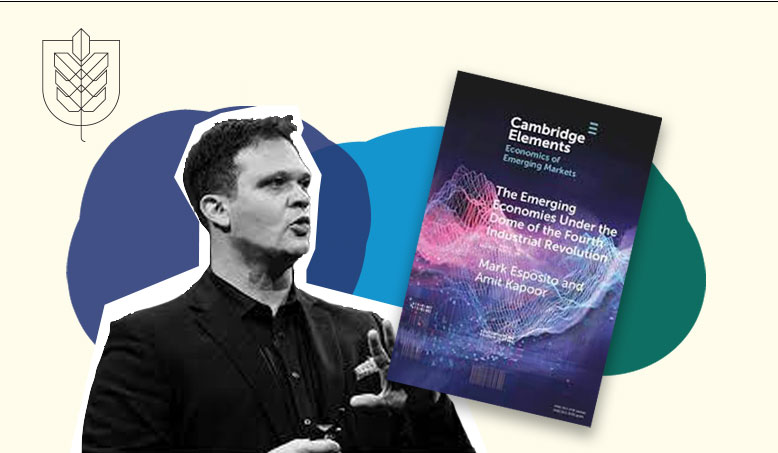Dr. Mark Esposito has spent a career studying economics and speculating about the role technology will have in their futures. In short, when he talks business you listen. Fresh from the publication of his new book The Emerging Economies Under The Dome of The Fourth Industrial Revolution—he shared his insights with Hult on the book and gave budding entrepreneurs some invaluable advice …
Today when we talk about 4IR we often talk about government initiatives to push development under the premise of technological supremacy.
The Fourth Industrial Revolution has been a hot topic in business for a few years, how is the conversation changing now?
The conversation has been evolving a lot from the inception of the concept back in 2015/16 when it was launched by the World Economic Forum (WEF). Today the fourth industrial revolution (4IR) is more of a movement that spans globally. While the WEF continues to be an advocate for it, today when we talk about 4IR we often talk about government initiatives to push development under the premise of technological supremacy. Today the narrative shifted also from large industrialized economies to emerging economies, hence the focus of the book.
When we see technology as an upgraded way to enhance a given system, we are inherently talking about 4IR and its premise.
Is it relevant to people outside the fields of business and tech?
The relevancy is in the access to technologies that are changing our productivity and also our way of working. When we mention, for example, work-life balance, we are implicitly referring to technologies that are enabling us. When we see technology as an upgraded way to enhance a given system, we are inherently talking about 4IR and its premise. It is at the core of what defines the aspiration around it.
So my primary audience is an audience that relates to public policy. My secondary audience is the community of business practitioners
Who is your book for and why is now a good time for it?
Lately, I have been shifting a bit of my attention towards policymakers in the context of Dubai, where I have a good chunk of my workload. This allows for more international relations to dominate the opportunities around the region. Policymakers benefit a lot from a conversation related to how technologies are going to permeate to business. This conversation helps them seize the opportunity around regulations. Additionally, since there is a lot of 4IR encircled in the way governments can experiment these days.
So my primary audience is an audience that relates to public policy. My secondary audience is the community of business practitioners dealing with how technologies can trigger the right level of digital transformation. All of this is to justify why it is a good time now.
Emerging markets grow at a different pace and present different challenges than the technologies that are established in more industrialized countries.
Your book focuses on emerging economies, will they be impacted differently from developed economies?
Emerging markets grow at a different pace and present different challenges than the technologies that are established in more industrialized countries. The emerging markets also have less inherited infrastructure so they can leapfrog more radically from one point of maturity to the others. But the lack of systematic access makes it even more sensitive to the planning of the 4IR technologies as a force for good and equalization. So there are important differences that we have taken into account as we were organizing our thinking with this short book.
It is a wonderful experience to be able to teach economics to such a variety of young people.
As an economics professor, are you focussing on this topic in your classroom?
I tend to find that when we teach economics and we apply this to real-world challenges, it becomes a cradle of important and relevant conversations that are now expanding collective thinking. It is the strength and the fascination of our school. We are global and we care about global problems while preserving a mindful look at the local context in which we teach. It is a wonderful experience to be able to teach economics to such a variety of young people.
4IR is changing education as we speak.
Do you see 4IR changing education as well as industry?
4IR is changing education as we speak. The shift from education to knowledge and the power of EdTech is shaping the learning process alongside the industry itself. We can keep up by integrating technologies that expand the experience and allow each one of us, regardless of students, staff, or faculty, to do more in our respective roles. So, I am a bit advocate of technology as a way to augment humans. Education is a great place for this premise to be fulfilled.
What is happening is a great mobilization and it is calling upon us to be part of it.
Do industrial revolutions of this kind ever really end?
I think we are just at the beginning of a number of cycles of transformation that will continue to involve us in the next decades for sure. We are truly transforming in such a short period of time and we are doing it in unprecedented manners. What is happening is a great mobilization and it is calling upon us to be part of it.
My advice: take risks!
What’s your advice for budding entrepreneurs and business leaders?
Immerse yourselves into this incredible period of our history and become an architect of change. The time to be observers and bystanders is behind us. We must move our collective thinking towards the opportunities emerging from this remarkable period of our history, which only happens if we take risks. My advice: take risks!
Mark’s book The Emerging Economies Under The Dome Of The Fourth Industrial Revolution is out now available as part of a series curated by Cambridge University Press called Essentials.
Read more from Prof. Mark Esposito on how the fourth industrial revolution will impact emerging economies.


